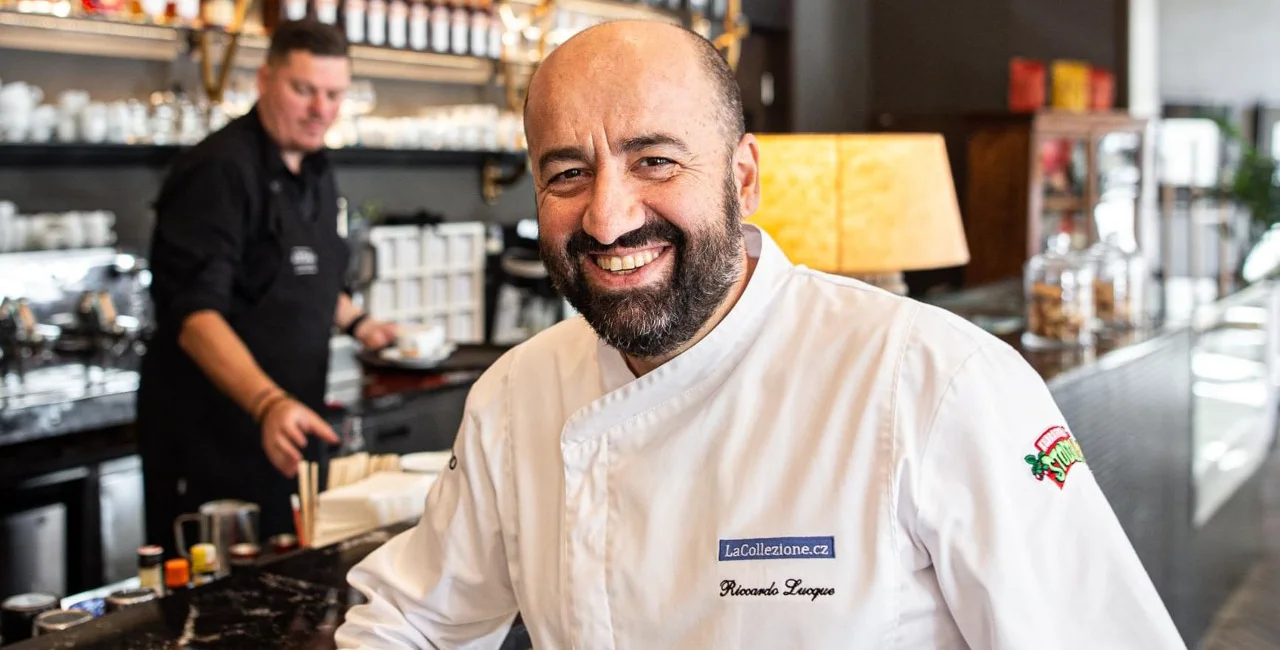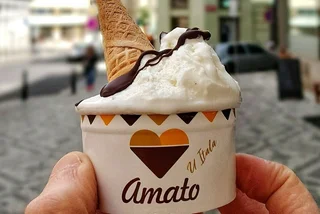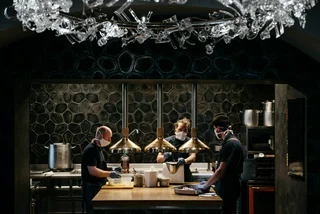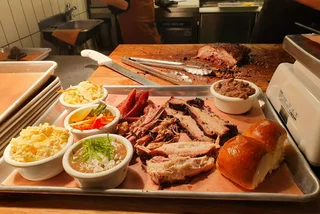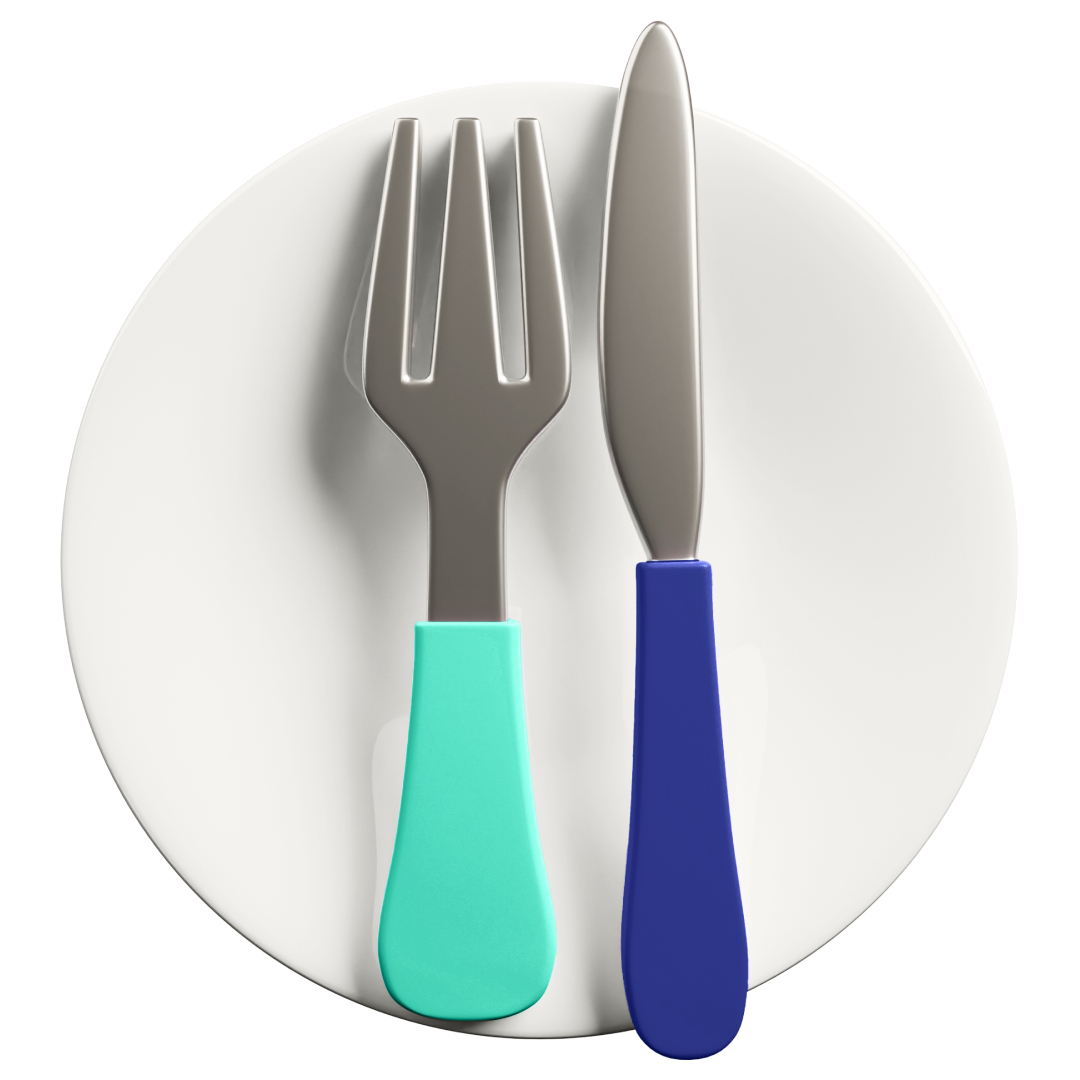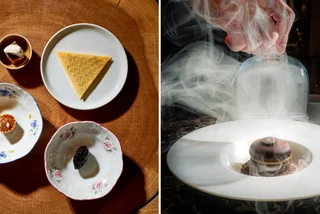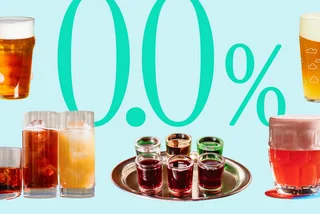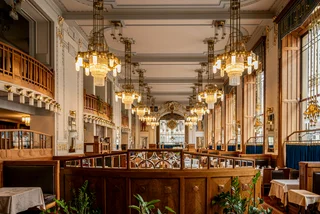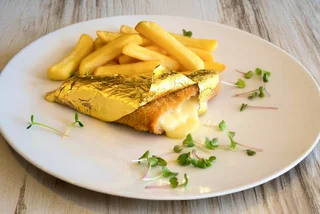Riccardo Lucque is chef and owner of La Collezione, the restaurant group behind a number of influential eateries in Prague, including Aromi, La Finestra in Cucina, Amano and several La Bottega bistros. Expats.cz spoke with Lucque about the city’s current restaurant culture, his own culinary journey, and the influential Italian expatriate community in Prague.
This interview has been edited for length and clarity.
I want to ask about your background and where you think things are going here, but I should start by asking what brought you to the Czech Republic.
Well, actually, that was a long time ago. It was in 2002 that we decided to come to the Czech Republic. We were previously living in the UK for almost 10 years. There was a moment when I was working for three months in New York as well, thinking to move there. That didn’t happen, and we’ve been in the Czech Republic since 2002. My wife is Czech, so that also helped me to decide to move over here. And while we were in UK, we were always visiting Prague. I saw the potential that I could do something here in a much easier way, financially speaking, than in London. So we moved here, and I started to work for Kampa Park and Nils Jebens, one of our expat friends. And after two years I found my place and decided to open it.
And that place was which one?
The first one was Aromi. The first Aromi, when it was on Mánesova street.
Oh, I remember.
(Laughs.) Yes, the very successful trattoria-style restaurant. It was incredible. It was my first business. I mean, I sold my house in the UK. I put everything into it, thinking, “Let’s see if this will work.” I had some ideas. And I was quite lucky that my wife said, “Okay, do it. It’s fine.” (Laughs.)
So we gambled everything we had. And in that period, nobody believed in me, because of the location. Mánesova was not in the center of Prague. It has another ambiance now. Very busy. Jiřího z Poděbrad is a completely different thing, that area. But in the beginning, the only thing that kind of reassured me was that Ambiente was next to me. You remember Ambiente. In the early days, they started on Mánesova as well.
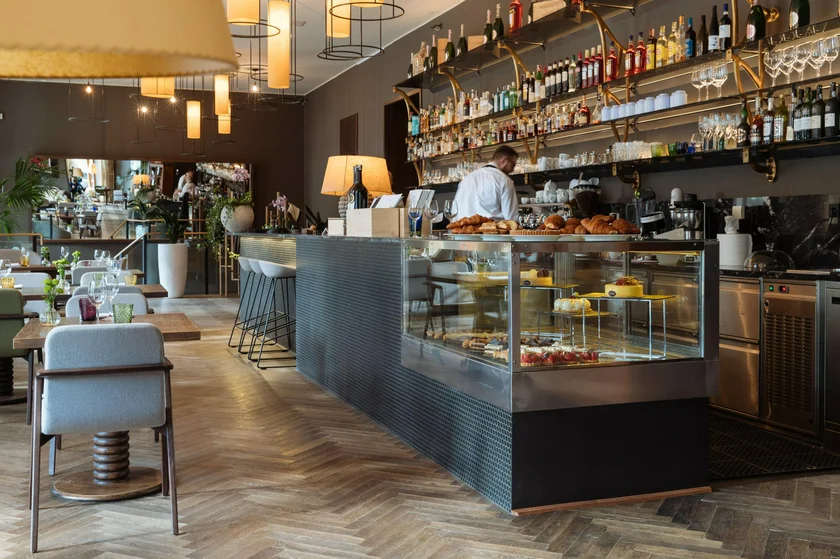
Of course. Mánesova then later became sort of a gourmet strip. It had a number of really great destinations on it, interesting places, still does even today.
That's true. It used to be actually a very strong point for us because in the center of Prague there were not as many businesses as now. So that was quite unique, what we managed to open in the beginning. I was one of the first in the Czech Republic who was serving fish and fish dishes. We were very humble, very modest as well.
I remember when I visited, I saw the U.S. ambassador and his wife. I saw a very powerful real estate developer as well. I saw three or four other guests who were sort of famous people in Prague. It looked like it was going to be a success immediately.
Yeah, we were. I was overwhelmed, really, that everything was working and that we managed to attract all these nice people. Good times.
And since then, you've basically created a small empire of restaurants.
Yes. You know, my biggest worry in life is “What next?” I’m a very anxious person and I just need some security in life. (Laughs.) So what a restaurant has, every restaurant has got a quite short life, you know — after 20 years, people, they get tired. People don’t want to work any more and the restaurant declines. This is the lifespan of a restaurant, in my opinion. So I tried to really create is something different. And I did, straightaway, with the shop. I opened a little shop in Mánesova called La Bottega di Aromi, remember?
Oh yes.
And that was a very successful project, which took me, actually, to the Bottega chain which I have now. And of course, La Finestra, which is now one of my most successful restaurants. And in La Finestra, I needed to do something different, so I started to serve meat instead of fish. I tried to differentiate the businesses. La Bottega was born actually during 2010 when there was the financial crisis — not for us because I didn’t really feel it, but I knew that something was coming. So I thought, “Let’s open something for everybody.” Something bit less “fine dining” where it’s a bit less expensive, in order that everybody can join in, using the same ingredients, but cutting on service and the little things which make a restaurant expensive to run. So that’s how we started.
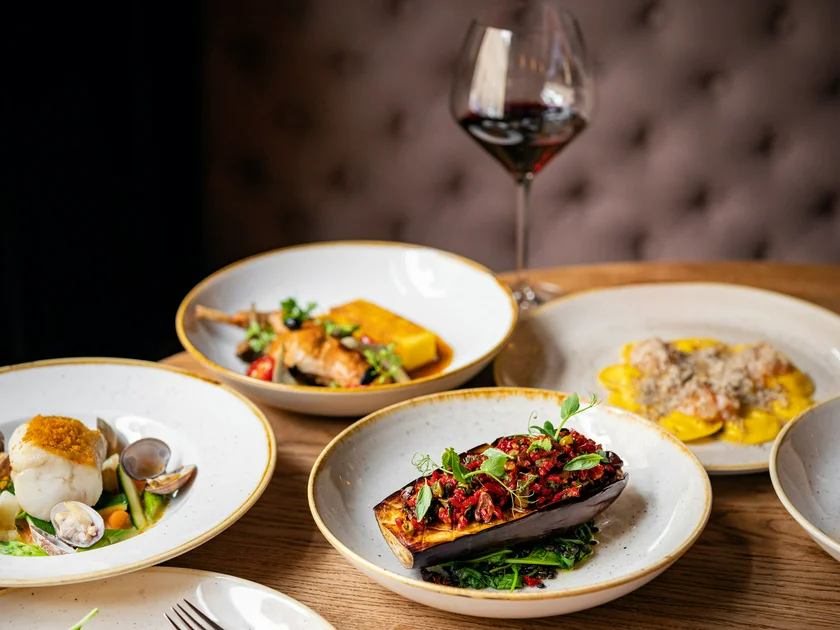
We saw that at the same time with other groups. The Lokál chains started after the 2008 crisis. And that was a real turn away from what Tomáš Karpíšek’s Ambiente group had done with much more expensive dining to something more affordable. It was a pub, but with really good food. And now it’s also a little empire of its own.
Absolutely. Tomáš Karpíšek is the guy at the top of the catering business in Prague. He is really someone who can differentiate himself with many things, many projects, while honestly, I cannot. I'm the conservative Italian guy. That's what I know. That’s what I do. (Laughs.) You will never see me opening anything other than Italian fare.
I have to ask, have you adapted or changed your cuisine for local tastes? Have you had to make changes in any way in terms of what you serve?
I try to be as regional as possible. I don’t make any compromises on how pasta should be cooked or how a risotto should be served. So the answer is no. But what I do is I try to pay tribute to the Czech people. In my menu, for example, you might find smoked butter, for example, or some smokiness or spices which I normally don’t use in Italy. So the technique is always the same, but for some of the things, yes, I take some of the taste of the Czech Republic and pay a tribute.
Also, you yourself are always developing. You know, you are not the American that you used to be when you left your country. Now your culture is more open and of course, your thinking is different. And it's the same with cuisine. I think there is always development according to your experiences.
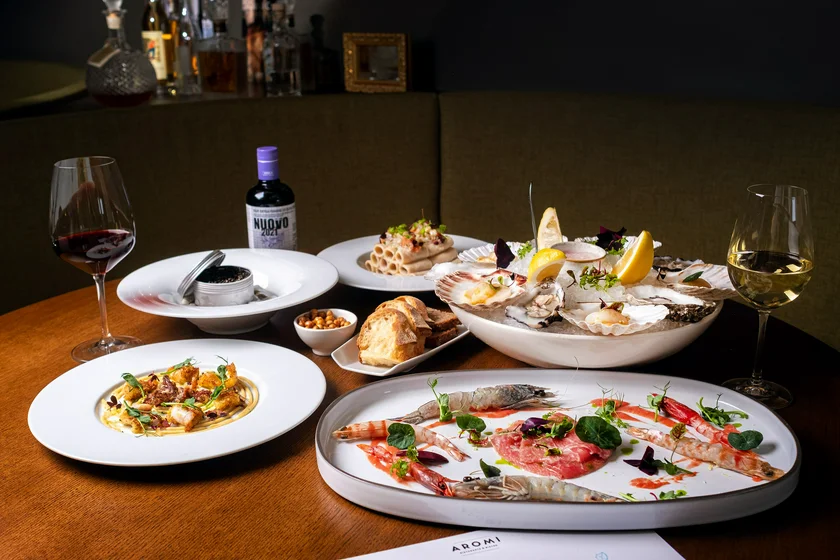
That’s true. I was talking to an Italian friend of mine about a restaurant in the north of Italy that tried to cook pasta like they do in the south of Italy, and the locals there just wouldn't go for it. Have there been any things that just did not work here, that were just failures?
Oh yes, absolutely. There were different things, actually, that were not working here. Not in terms of the consistency of the pasta — I don't care about that really. I don't care to adjust the cooking of something according to taste. I mean, if you go to China, all the noodles are completely overcooked, and Chinese people are used to them. But what didn't work were certain dishes that I was sure would work. For example, there is a recipe for baccalà mantecato, which is a fish that we love, which we do in the north of Italy. And I've tried to serve this in so many different ways. I still have it on the menu at Aromi, and now it is working, because it’s surrounded by parmesan, which cuts the taste. But some of the dishes, definitely. They’re part of the culture, and you cannot really win with those dishes unless you find an Italian expat customer who really loves to eat them.
I wanted to ask about your new cookbook, which you published with Zdeněk Pohlreich. Can you tell me about that?
I’m very proud of this cookbook. Because with Pohlreich, we’re friends, you know, he buys pasta from us and we call each other now and then, and he approached me and said, “Riccardo, you have a very crappy cookbook, the first one you did, which you should be ashamed of.” And I kind of was. And he asked me, “Do you want to do a new cookbook? I will give you support, with my company and everything and you can create whatever you like.” And I said, Yes, fine, because I knew the team behind it, and I had collaborated with them on another project before, in the Prague Culinary School of Roman Vaněk.
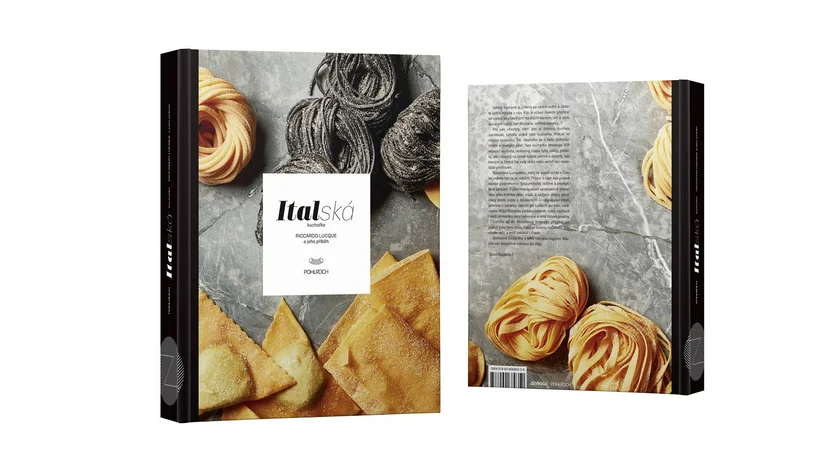
So yes, and it was a fantastic experience because this book is actually my pride. It talks about my life and my friends in Italy. We traveled quite extensively, all over in my region in Marche, and we managed to include all my friends, my suppliers, and the chefs I like. We spent 10 days taking pictures and researching. The recipes are quite simple, but they are actually the dishes I like. It was very hard to do, a lot of work and a very good experience. So yes, I’m very proud.
What will readers get from this cookbook that might surprise them? Is there something that they're not going to expect?
I try to play classic, you know, as much as I can. Some of the recipes were actually the recipes from when I started Aromi. I wanted to create a cookbook, which talks about Italy, which is me, which is my cooking. And what’s very nice is that I constantly receive pictures from people on social media as they're cooking the recipes and trying to show me what they did. And they thank me for the book, which is really very, very, very nice of them. I didn't expect so much warmth from people. Twice a week, probably, I receive pictures and they just keep coming, which is fantastic. I love it.
That's the best praise you can get.
I know. That's it. That's it. I mean really.
You mentioned Italian expats liking certain dishes in your restaurants. Are most of your clients tourists or locals, Czechs, or the Italian expatriate community?
No, but thanks to the expat community living in Prague and the local people here we managed to survive this Covid hysteria, you know? Tourists are actually a very important part of my business, and nowadays they’re a little bit less, unfortunately, but eventually, they will come back. Depending on the restaurant and the location, you know. In Aromi, I will get probably 20 percent tourists. In the center at La Finestra, a little bit more, because it's a more central part of Prague. So it’s according to the location. But what I like is that local people — Czechs, expats — are coming to my restaurant. That’s very important for me. I never aimed to have a restaurant for tourists.
My kids went to a public elementary school in Prague with a lot of Italian-speaking students, so I know from personal experience that there is a large Italian community here. Can you talk about that? Where is the Italian community most active? What are the Italians here doing besides making great restaurants?
There was a big boom in the Italian community with construction in Prague. There were a lot of people who were buying buildings, a lot of architects, a lot of people with building companies as well. So I think that the majority of the Italians came as investors in order to do business in nemovitosti, in estates. That's the majority of them. I know some restaurateurs as well. And of course, now many foreign companies or Italian companies in the Czech Republic have Italian employees. So it's quite a wide community, absolutely. I'm also part of the Italian Chamber of Commerce, a member of the executive over there — the consiglio, or council. We meet every month. And I'm discovering actually that I don't know many of the Italians around, because it's a lot of members.
I can introduce you to my neighbors. They're Italians.
(Laughs.) Who is that? Who is he? What is his name? Maybe I know him.
There are quite a few in my neighborhood, actually. My kids were coming home from first grade saying, “Daddy, bongiourno!”
They pick up it very fast.
Yeah, almost immediately. I was going to ask, and you touched on it briefly before: Can you give me an overview of what the pandemic has done for the restaurant business in Prague?
Well, it has been a big disaster, you know. We really lost, from one day to another, all the income we had. I mean, I’m okay now, because I kind of regained my peace of mind. Now it's not a pandemic anymore. Now we are open. Even if they close us during the week after 10 o'clock, I don't care — I need just to be open and to do some business now. But for us, it was a disaster. It really affected me psychologically. It really changed me a lot, because I had 240 people to look after, and suddenly I was without income and I had to make really big decisions. And the reopening also was very difficult, because suddenly from 240, we had about 80 people left. Many of our people changed their lifestyle. They don't want to come back to this job because they have families and they don't have any security. They may think that, okay, the pandemic will come back again. I guess, or I hope, that the worst times are over now and we can look forward to some normality. Slowly. I hope so.
Do you think there will be a change in the way people eat and drink?
Yes, we saw that with the takeaways — they are much more popular. But I don’t think it will be affected in the longer term. People like normality. Everybody wants to go out once again. And as soon as they feel secure, I don’t think they are going to change that. I'm looking forward to my next travels just like you are, just like everybody. Maybe there will be some changes, yes. Maybe somebody discovered that they can have food at home and they don’t bother to go out again like they did before. But that will be a small percentage in my opinion.
It's pretty clear that Italian food has been the favorite type of cuisine in Prague for the past 20 years or so. We've seen growth in new styles, however, and new areas of interest for diners. Vietnamese food went from non-existent, despite the large Vietnamese community here, to a very big story. We've seen a wave of street food or diner food, like pastrami sandwiches, burger festivals and the like. What do you think of the recent changes in culinary culture in Prague?
I think it's an evolution that we're seeing in every country, or we're maybe just a little bit behind it here. I think the biggest change a few years ago was Czech cuisine — everybody now has a big interest in Czech cuisine, they rediscovered their own cuisine. They started to make it in a lighter way and everybody's very proud: Czech people are very proud of the Czech kitchen. Like everybody else in the world, you are proud of your own culture, of your own cuisine. That was actually the big change for me. And now, definitely, you see Vietnamese, which is very interesting. It’s perfect. But you know, if you go to a town like London, Italian restaurants used to be a very popular before, but now, it's Chinese restaurants, or Japanese or Asian cuisine which is actually more trendy now, and that will come here, too.
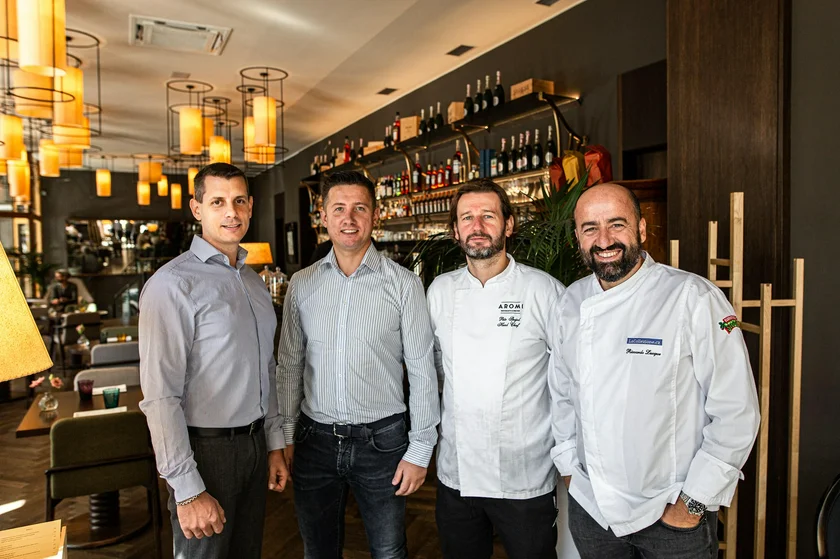
This is coming now. They’re normally very cheap, very affordable. They are very tasty. Definitely. And, as you say, also the food trucks. With the pandemic, as well, everybody is trying to do something different. (Laughs.) I also opened a space, Mare in Manifesto Anděl, which just started, and we’re doing panini de mare, actually — seafood sandwiches. Before this phone call, I was working on the new menu because we are trying to make something different. But yes, the trend is there and people are following it. I think it's an evolution which every country is seeing.
How do you feel about American barbecue? (Laughs.)
(Laughs.) I mean, I was in the States. I have friends in the States. I was working in New York. My son was born in Las Vegas. So, definitely. I like it. I like the way you do things. There was a period of my life when I wanted to move to the States. It didn't work out, and that was before 9/11, but I was there. After my wife couldn't join, I kind of gave up, but I really wanted to explore the American dream in that period. (Laughs.) Nice, good, tasty, easy. But really, I'm more for the Italian cuisine. I always say that Italian cuisine is very similar, to me, as a mentality of cuisine, to Japanese cuisine, because in Japan, they are looking for a pure taste, as is Italian cuisine. We're looking for a pure taste when we do a tartare: we put just salt and pepper and touch of olive oil, because we want to taste the meat. The Japanese, as well, they're really about the purity of the ingredients. (Laughs.) Your American barbecue is too strong. (Laughs.)
I wanted to ask about food miles. People are deeply concerned about the planet and the environment. And in recent years, people have started thinking more about the environmental impact of shipping food. How does that affect restaurateurs like yourself? How does that affect how you think about food, how you plan meals and serve food?
You know, this food mile concept, was already popular in Italy, 25 or 30 years ago. Not because we were concerned about pollution, the consequence of the transportation, but because we are very proud of our local products. There are still some restaurants that are serving only the wines which are coming from this little province, the ingredients which are from this area, all that. And this is correct, if you want to showcase some genuine thing which is profoundly coming from your culture, which is part of where you are from. Regarding, us in Prague, I would love to do more, to adopt the culture of this type of restaurant, which I kind of do already, I’m using some key ingredients that I can find around me: lamb, other types of meat, eggs, and some produce.
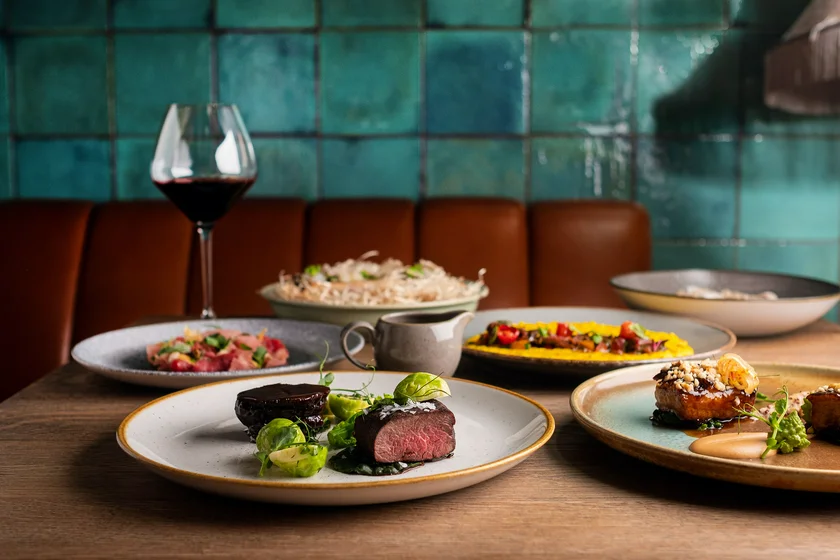
But unfortunately, having an Italian restaurant, I really need products which are coming from Italy, which are made over there. So there is lot of transportation. But I'm working with the mozzarella guy, Marco, from Mozzarellart, and wherever else I can, I’m definitely getting supplies from places near me. Also, I used to have San Pellegrino water, and I don't have it anymore. I just decided to purify water in my own restaurants and avoid these big up and down deliveries of water. I mean, what is this? This is so, so stupid. So definitely, we're trying to do something about that.
Do you have any predictions for the next trend for food in Prague?
There will be more and more Asian. And I hope they stop takeaway. (Laughs.) I hope takeaway stops because I hate — I hate — takeaway. (Laughs.) I hate it. Really.
Why? Do you hate selling it or do you hate ordering it?
Selling is fine. But you know, every time you order takeaway, it's like 70% worse than what it used to be in the restaurant. The food is suffering. I'm wondering what kind of food actually works for takeaway. I mean, if you go to Kentucky Fried Chicken, that's probably as good as takeaway can be. That's the best I can think of. So, takeaway — I hate it and I don't recommend it to anybody in order to have a culinary experience. But unfortunately now it's the only source we can have, or at least it used to be. So I hope takeaway is going to collapse. (Laughs.) And of course Asian will be more and more popular. And I hope that Italian will stay forever. (Laughs.)
Last question: What do you want to teach people? What would be important for you to communicate to people about food and drink?
You know what, my business, my group is called La Collezione, and as part of that I also have a cooking school. And for me, teaching people in our cooking school the culture of what we do do in Italy is so important. What I want to teach people is to look after the product, to buy good products, because the best food you can have is when you start from a good product. And I always tell people, my ingredients for each dish are three, four, maximum. But in order to make it a good dish, you really need good ingredients, because you cannot cover anything up if you have very few ingredients.
I always tell people to buy pasta which costs four euros, or 100 crowns, instead of this pasta which costs 50 crowns, because you’re really saving money with good quality.
For me, really, the quality of the ingredients and seasonality is the most important thing. I always try to tell not only customers, but also a lot of my chefs to really respect the season much as we can. I made a big chart of which vegetables are in season each month, and also the fish, seafood, oysters, and so forth. Once you have these two elements — good ingredients and seasonality — you already have 60 percent of your job done. That’s the most important thing for me.












 Reading time: 16 minutes
Reading time: 16 minutes 